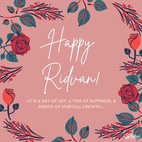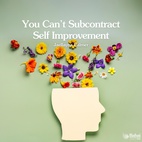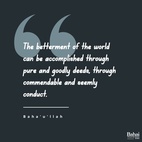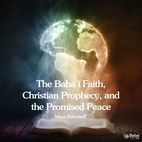The views expressed in our content reflect individual perspectives and do not represent the official views of the Baha'i Faith.
Darius I was a much-liked king of ancient Persia. It is said that unlike his predecessors, his popularity grew because of his spiritual qualities. He was fascinated by, and perhaps even secretly envious of, the lifestyle of the dervish. Dervishes were known for renouncing the material world and roaming the countryside, spending every waking moment in devotion and praise of God. A dervish’s possessions usually included only his clothes and a basket in which to carry a few small belongings often given to him by well-wishers.
Darius I was so attracted to this simple spiritual lifestyle that he invited a well-known dervish to his palace. When the dervish arrived, the king sat at his feet and requested that he explain what detachment means. The king’s interest delighted the dervish. He stayed in Darius’s palace for a few days and, whenever the king had time, the dervish would teach him about the virtues of a beggar’s life. On the third day, after careful consideration of all he had learned thus far, the king left the palace, his family, and all the comforts known to him to join the dervish, dressed in the garb of a poor man.
By dusk, they had already traveled far. When it came time for them to retire for the night, the dervish realized he had left his basket at the palace. Looking very disturbed, he said, “I beg you, we have to go back to get my basket!”
The king replied, “We can manage without the basket. Some generous soul will give us one.”
The dervish looked very determined and exclaimed, “I cannot continue without the basket!”
Shocked by the dervish’s behavior, the king exclaimed, “I, a king, have abandoned my palace, wealth, and power. You, who preach the virtues of detachment, have been tested by this virtue and failed because you are attached to this world — to a small basket.”
According to the Baha’i teachings, detachment from the material is a highly desirable pursuit. That this king was able to walk away from the comfort of home is commendable. Abdu’l-Baha, the son of the prophet and founder of the Baha’i Faith, Baha’u’llah, wrote: “Angels are also those holy souls who have severed attachment to the earthly world, who are free from the fetters of self and passion and who have attached their hearts to the divine realm and the merciful kingdom.”
We become attached to many things which can hinder personal progress, and today, attachment is one of the greatest obstacles to unity. There are many sources of attachment in this world, but I have chosen four to explore here: identity, religion, wealth, and spiritual qualities. Discrimination based on these three often happen around us in subtle ways.
Attachment to Identity
My wife and I have been married for over 35 years, and our cultural identity comes into play often in our interactions. For example, she will emphasize how certain ways are English or Irish, although she was born and raised in Canada. Due to her family upbringing, she is adamant on waiting until everyone is seated before eating.
Similarly, though I was born on an island far from India, my cultural inheritance often surfaces in my mannerisms and personal biases. My biggest identity hurdle was tardiness. In 1970, at my very first job in Montreux, Switzerland, my boss was disgusted when I arrived half an hour late. That habit of mine continued while living in Canada, and I blamed it on my Indian heritage, calling it “Indian time.”
Of course, living in a diverse environment means practicing empathy with others and honoring one’s identity, regardless of where one is rooted. And then comes compromise: one has to recognize that values given by our parents or society are not always the best for this age or these circumstances.
We have to be flexible in our approach. When we stay too rigid, society breaks. Making an effort to understand one another can help bridge contentious relationships — for example, Westerners find it polite to make eye contact during a conversation, but it is not so everywhere, especially among women of Asian backgrounds. Understanding why people behave the way they do, and adjusting our attitudes accordingly, helps create unity among people of different backgrounds.
Attachment to Religion
Religion can sometimes become another obstacle to harmonious multicultural coexistence. People say that one should not discuss religion at the dinner table, as it often ends up in disagreement and disunity. Why does such a conversation evoke heated emotions? We reach treacherous ground when our attachment to an idea or belief is so profound that it reaches a fanatical zeal and exceeds our desire to create bonds of love and trust with one another.
RELATED: How Being a Baha’i Deepened My Definition of Interfaith Relations
Exchanges can easily become contentious when we are trying to convert the listener to our way of thinking, but instead of refusing to discuss religion altogether, we can encourage elevated conversations on profound subjects such as religious teachings.
My wife and I attended the conference for the Parliament of World Religions in Toronto in November, 2018. It was an eye-opening experience from the moment we arrived there. We discussed spiritual beliefs with Christians, Buddhists, Sikhs, Jews, Muslims, and members of many other spiritual groups. We learned about the common ground we all shared, but also discovered some interesting differences that made us appreciate the diversity of our planet.
Both of us were very delighted in such an environment. Baha’u’llah said, “Consort with all religions with amity and concord, that they may inhale from you the sweet fragrance of God. Beware lest amidst men the flame of foolish ignorance overpower you.”
Attachment to Wealth
As a financial consultant, I often discuss material assets with clients. What I have learned is that many of us are very proud of our financial status, and this can become a material attachment. There is nothing wrong with enjoying the good that our world has to offer, but when our identity becomes tied to our wealth, we tread dangerous waters.
RELATED: The Spiritual Meaning of Wealth
Baha’u’llah wrote: “… man’s distinction lieth in the excellence of his conduct and in the pursuit of that which beseemeth his station, not in childish play and pastimes. Know that thy true adornment consisteth in the love of God and in thy detachment from all save Him, and not in the luxuries thou dost possess.”
Attachment to Spiritual Qualities
As in identity, religion, or wealth, when we feel superior to others, our arrogance will be manifested in our behavior. For example, a kind person who grows proud of his kindness may start to perform acts of kindness not to be kind but to show off. He may further start to judge others as less kind than himself. The resulting behavior will be anything but kind.
Pride and the tendency to view others as inferior are signs of attachment to divine qualities. This attachment to spiritual qualities is the most dangerous of all. It is like the arrow that shoots down a high-flying bird. No matter how advanced it is, a soul can be brought crashing to the ground if wounded by the arrows of jealousy, lust, power, greed, or self-adoration. Spiritual maturity, on the other hand, is evidenced by the ability to recognize that every soul has received its fair share of divine grace.
Freeing Ourselves From Attachments
Everything around us, from food and clothing to family and friendship, has been created for our enjoyment. When gained in legitimate ways, we should enjoy them wholeheartedly and be truly thankful for them. None of these things, however, should ever become like gods to us, overshadowing the true purpose of our short earthly lives.
During any interaction, as in the case of the king and the dervish, our attachments can come to the surface. Such opportunities give us an awareness of the self and time to assess what we hold dear. Sometimes it is worth throwing away old useless habits and replacing them with that which brings comfort and happiness to others.
A balanced life grows our spiritual powers and expands our awareness beyond imagination.

















Comments
Sign in or create an account
Continue with Facebookor